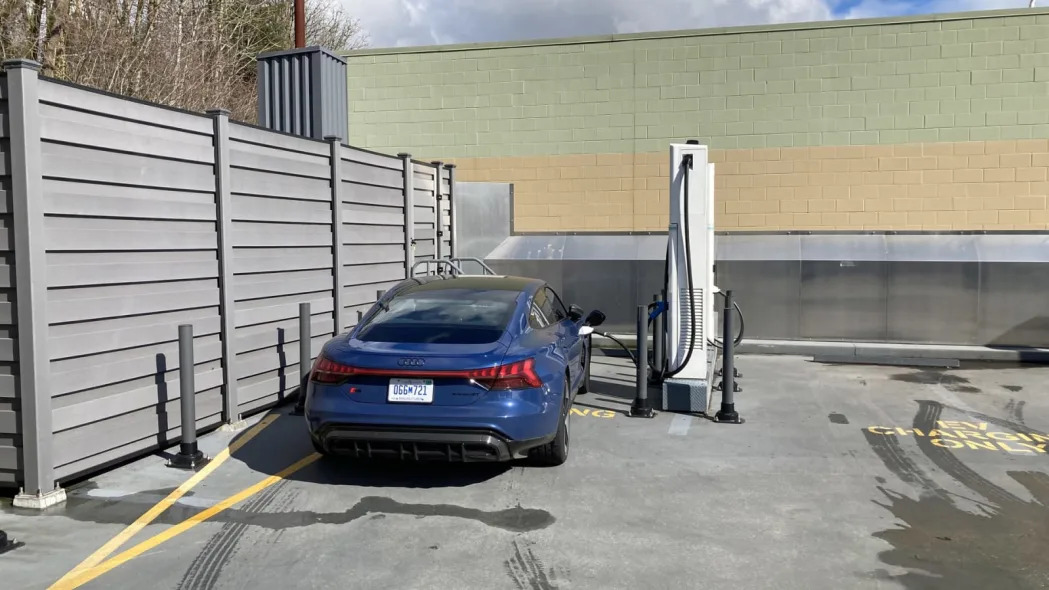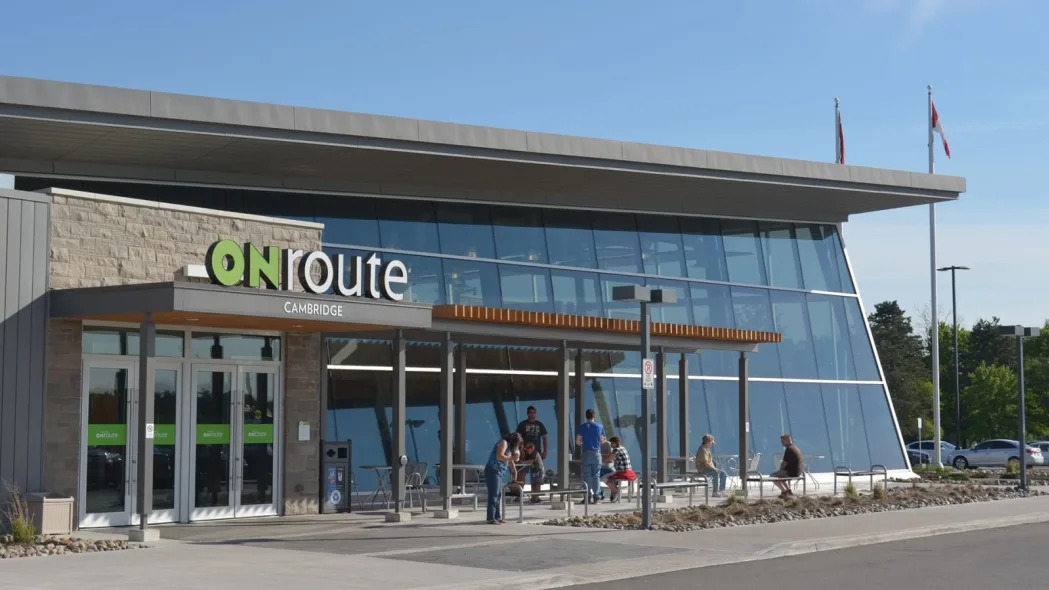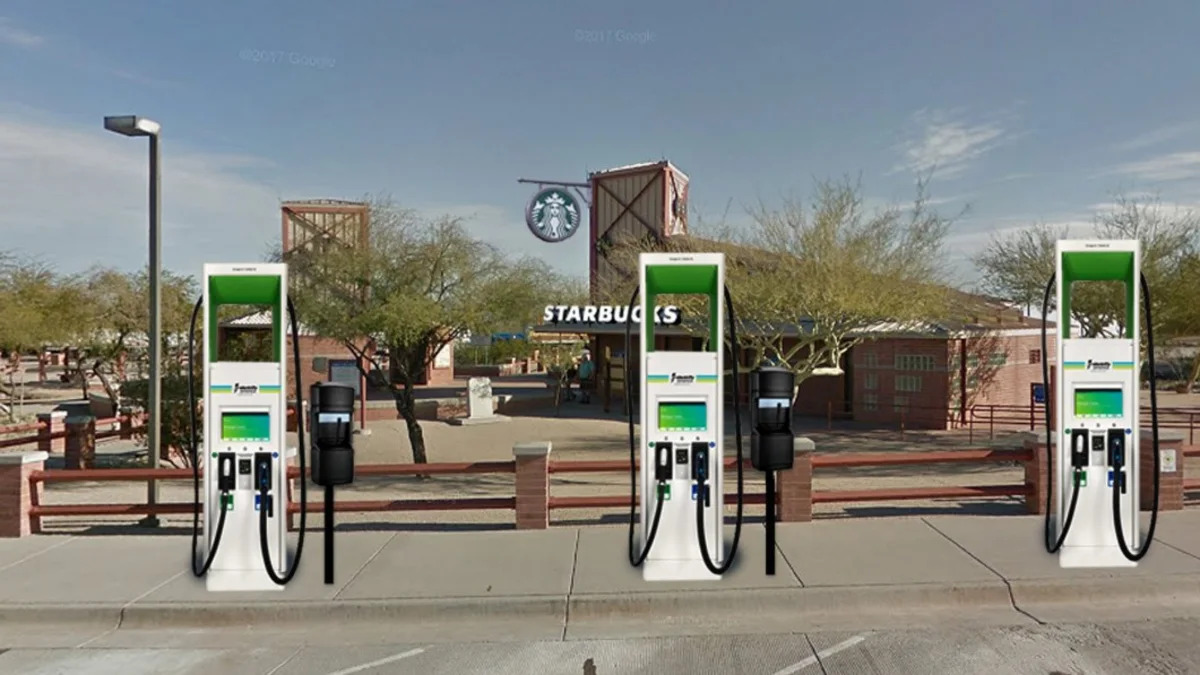It’s certainly not a bad thing that so many electric car chargers are in the parking lots of grocery stores and Walmarts. While recharging an Audi e-Tron GT yesterday, I managed to spend the 35 minutes doing some grocery shopping. It wasn’t a total waste of time.
However, when you’re just driving through a place and are possibly on a road trip, the last thing you want to do is seek out a grocery store or Walmart parking lot. First, they are often not right next to the highway as a gas station would be. Second, they are often in larger shopping complexes that take far more time to enter and exit. Both of these speak to a sense of wasting time that can be infuriating on a road trip.
Third, I don’t want to spend any amount of time in a Walmart, and I have a very hard time thinking that a person who can afford this $168,000 Audi RS e-Tron GT would be any more inclined to spend time in a Walmart. Fifth, grocery stores and Walmarts may have bathrooms and water fountains accessed technically for free, but that just feels weird, and more important, using them takes far more time than popping into a gas station (you’re paying to use) for the bathroom or to buy something from the store.

Basically, electric fast chargers need to be in a greater variety of places, especially those that are easily accessed from highways like gas stations are. Frankly, I think the Shells and Mobils of the world installing EV chargers at existing gas stations and gradually accepting the future would solve a lot of this (and wouldn’t be a terrible business decision), but let’s just assume they’ll be anti.
So, here’s my idea: High-speed chargers need to be installed in significant numbers at highway rest areas. These are quickly accessed, as opposed to be ensconced within a labyrinthian shopping center parking lot. They also provide bathrooms, water, areas to stretch your legs and let your dog pee. That takes care of two of three reasons you typically stop during a road trip: refueling and calls of nature.
The third reason will be addressed by my next idea: Allow and encourage restaurants, coffee shops/stands and other service businesses to open locations at rest areas. These businesses will contribute financially to the upkeep of the rest area, including the addition of basic car-related services like windshield-washing stations. This will alleviate the burden on state governments and also, most likely, result in better upkeep for rest areas as businesses tend to care about such things more than governments. Charger companies, perhaps multiple per rest area, will handle their upkeep.
Importantly, these updated rest areas will still be free for anyone to use. You don’t need to buy a $5 Starbucks coffee to use the bathroom or get your dog some water. We’re adding to existing rest areas here. The number of businesses should also be limited: a Starbucks in one, a McDonalds in another, hello Arby’s at exit 48. I'm sure there'd be some way to doll them out equitably.

I can’t say my idea is exactly novel. Far from it. Rest areas in Ontario are pretty much like this. Dubbed ONroute, they typically have a gas station and at least one fast food restaurant in a building adjacent to a rest area. There are similar "motorway service stations" in the United Kingdom. Now, these are inherently different rest areas than those throughout most of the United States, and specifically don’t have the same park-like feel, but there’s no reason the two concepts can’t be melded. That the refueling would be done at charging stalls rather than a gas station does reduce the real estate footprint and construction demands.
Furthermore, plenty of folks have thought of this here in the United States, specifically in regards to electric charging. There's just one major problem:
Commercialization of interstate rest stops is forbidden by a 1956 law restricting commerce to vending machines, lottery tickets and tourism information. Commercialization doesn't just include Starbucks and Arby's, by the way, but the charging stations themselves.
While the recent infrastructure law set aside $5 billion for chargers to be placed "as close to Interstate Highway System and highway corridors as possible" and generally no more than a mile from an exit, that's awfully wishy-washy language. The House-passed version of the law actually included language that would permit chargers at public rest areas, but that disappeared in the final law. The National Association of Truck Stop Operators and Society of Independent Gasoline Marketers of America (who represent more than 80% of U.S. gas/diesel sellers) are among the interests fighting rest stop commercialization. Fair enough, if they want to install EV chargers, again, that's a great option ... it just seems a wee bit unlikely.
Basically, then, I'm advocating changing federal law. The nation and individual states would satisfy green goals, enhance services for citizens and potentially alleviate the financial burdens of both, while also being a business-friendly endeavor. Maybe not to the national gas pumpers association or whatever (and oil companies), but automakers, EV charging companies, restaurant chains and other road side service providers should theoretically be on board.
So should we the people. The rest stop as we know it will still be there, but now we can also refuel our car and ourselves in the process. Win, win, win.
Check out the 2024 Chevy Silverado EV:


Sign in to post
Please sign in to leave a comment.
Continue